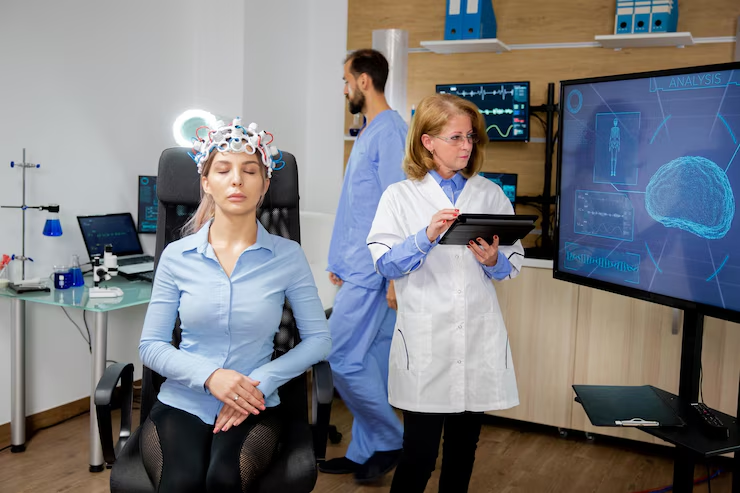When you feel something strange like headaches, memory problems, or shaking hands, the first thing you might search is Neurologist Near Me. Finding the right doctor for your brain and nerves can feel hard, but it doesn’t have to be. In this blog, I will help you understand how to find a trusted neurologist near your home without stress. I’ll also share tips, questions to ask, and signs that tell you it’s time to visit a brain doctor. This blog is made to be super simple and easy for anyone to read, even if you’re new to medical stuff. Whether you’re looking for help for yourself or someone you love, I’ve got you covered. Let’s make your journey to better brain health smoother, faster, and friendlier—because good care starts with the right doctor.
When you search for a neurologist near me, many names might pop up—but how do you know who’s the best? It’s not just about the closest doctor, it’s about finding someone who listens, understands, and treats you with care. A good neurologist can help with problems like dizziness, seizures, trouble walking, or even sleep issues. They check your brain and nerves and make a plan to help you feel better. But not every doctor is the same. Some may have more experience, better reviews, or offer online appointments. In this post, I’ll show you how to check these things in a simple way. I’ll also explain the difference between a neurologist and a neurosurgeon, and when to see one. With this guide, you’ll feel more confident about choosing the right neurologist who fits your needs, and you’ll know what to expect at your first visit too.
What Does a Neurologist Do and When Should You Visit One?
A neurologist is a special kind of doctor who helps people with problems in the brain, nerves, and spinal cord. These doctors check things like memory loss, headaches, shaking hands, trouble walking, or numbness. If your body feels weak or your mind feels confused, a neurologist can help find out why. They don’t do surgery but give tests and treatments like medicine or therapy. You should visit a neurologist if you often forget things, feel dizzy, or your muscles don’t move properly. Sometimes small signs like feeling confused or losing balance can mean something serious. So, if you’re asking “should I see a neurologist near me?”—the answer could be yes, and it’s better to go early.
Neurologist Near Me: Signs You Shouldn’t Ignore
If you ever feel numbness in your arms, forget simple things, or get bad headaches that don’t go away, you might need a neurologist near me. These are signs your brain or nerves might not be working right. Some people also feel weak, dizzy, or have trouble seeing or speaking. These signs might seem small but could mean something bigger, like epilepsy or stroke. It’s smart to listen to your body. If these problems happen again and again, don’t wait. Go see a brain doctor before it gets worse. Your health is important, and catching these signs early can help you get better faster. A good neurologist can find the cause and start the right treatment before it’s too late.
How to Choose the Best Neurologist Near Me: Easy Steps That Work
When you search for a neurologist near me, don’t just pick the first name you see. Take your time and check their experience, reviews, and what other people say. Look for a doctor who has treated your problem before. You can visit their profile, see their rating, or ask friends and family for help. Make sure the neurologist is kind, listens to you, and explains things clearly. Online options are also good if travel is hard. Some doctors give free advice in the first call. Don’t forget to check the hospital or clinic they work in. The best choice is someone close, trusted, and easy to talk to. You deserve the best care, and it starts by choosing the right person.
Top Brain and Nerve Problems Treated by Neurologists
Neurologists treat many problems that affect the brain, spine, and nerves. Some of the most common ones are epilepsy (fits), stroke, memory loss, migraine, and Parkinson’s disease. They also help people who feel weak, dizzy, or have trouble speaking or walking. Kids and adults can both have nerve problems, and a good neurologist near me can treat them all. If you feel a sharp pain in your head often or your hands shake, that might be something serious. Even back pain and numb legs can be signs of nerve issues. A neurologist checks your body, asks questions, and may do some tests. Then, they give medicine or other treatments to help you feel better and live a healthy life.
Neurologist vs. Neurosurgeon: What’s the Difference?
Many people think neurologists and neurosurgeons are the same, but they are not. A neurologist checks brain and nerve problems and treats them with medicine or therapy. They don’t do surgeries. A neurosurgeon is a doctor who performs surgeries on the brain and spine, like removing a tumor or fixing a broken nerve. So, if you search for a neurologist near me, make sure you need help with things like headaches, memory loss, or seizures. But if your problem needs surgery, like a brain injury or a big tumor, then a neurosurgeon is the right one. Both are smart doctors, but they help in different ways. Knowing this difference will help you choose the right one for your needs.
Online or In-Person: Which Neurologist Near Me Is Right for You?
Sometimes it’s hard to go out and see a doctor. That’s why many people look for an online neurologist near me. Online visits are good for small problems like asking questions or showing reports. You can talk to a doctor from your phone while staying home. But if your problem needs tests or a close check, you should visit in person. Some people also feel more comfortable talking face-to-face. Both ways are okay—it depends on your health and what feels easy for you. Always ask if the doctor gives online visits, and check their reviews. The best doctor is one who listens, explains well, and gives you help—whether online or at a clinic near your home.
What to Expect at Your First Neurologist Appointment
Your first visit to a neurologist near me may feel scary, but it’s simple and helpful. The doctor will ask questions about how you feel and what problems you are having. They will also check your strength, memory, balance, and how your eyes and arms move. Sometimes, they may suggest tests like an MRI or EEG to see how your brain and nerves are working. You should bring your medical reports or a list of your symptoms. Don’t be afraid to talk or ask questions. The doctor wants to understand your problem and give you the best care. This first step is important to know what’s wrong and how to fix it. Be honest and relaxed—it’s all about helping you feel better.
Questions to Ask Your Neurologist on the First Visit
Meeting a neurologist near me for the first time? It’s a good idea to ask a few important questions. Ask what might be causing your symptoms and what tests you may need. You can also ask if your condition is serious, how it can be treated, and what you should avoid. Don’t be shy—this is your health, and your doctor is there to help. You can also ask if the treatment has side effects and if follow-ups are needed. If you’re confused about anything, ask again until you understand. It’s okay to write your questions before the visit. That way, you don’t forget anything. The more you know, the more confident you’ll feel during your journey to better health.
Neurologist Near Me for Kids, Adults, and Seniors – Who to Choose?
Everyone—kids, adults, and older people—can have nerve problems, but not every neurologist near me is right for all ages. Some doctors treat only children. These are called pediatric neurologists. They help kids who have seizures, learning problems, or brain injuries. For adults, a general neurologist is a good choice. They can treat migraines, strokes, and memory loss. Seniors may need special care for diseases like Alzheimer’s or Parkinson’s. Always check the doctor’s profile to see who they treat. If you’re choosing for a family member, pick someone with good reviews for that age group. A kind, experienced neurologist who speaks in simple words is best for all. The right doctor will understand and treat you or your loved one carefully.
How to Read Reviews and Ratings for Neurologists the Right Way
When searching for a neurologist near me, you’ll see many reviews and ratings. But how do you know which ones are true or helpful? First, read more than just one or two reviews. Look for words like “listens well,” “explains clearly,” and “kind and patient.” These show the doctor cares. Be careful if you see only perfect 5-star reviews—it’s good, but a mix of real feedback is better. Also, check how many people reviewed the doctor. A few honest reviews are better than many fake ones. Look at how recent the reviews are, too. Older reviews may not show the doctor’s current work. Good reviews and honest ratings can help you choose a neurologist who is trusted and easy to talk to.
Conclusion
Finding a neurologist near me is not hard when you know what to look for. If your head hurts, your hands shake, or you feel dizzy a lot, it’s time to talk to a brain doctor. You don’t need to be scared—they are here to help you feel better. Just take one step at a time.
Always pick a neurologist who listens to you, explains things simply, and makes you feel safe. Whether you go online or in person, the right doctor will care about your health. Remember, small signs can mean big problems, so don’t wait too long. Your brain is important—take care of it.
FAQs
Q: What does a neurologist treat?
A: A neurologist treats problems with the brain, spine, and nerves like headaches, memory loss, and shaking hands.
Q: Do I need a referral to see a neurologist?
A: No, you can book a neurologist directly, but some hospitals may ask for a referral.
Q: Can a neurologist help with sleep problems?
A: Yes, if your sleep problems are from your brain or nerves, a neurologist can help.
Q: Is it okay to visit a neurologist online?
A: Yes, for small issues or follow-ups, online visits are safe and easy.
Q: What tests does a neurologist do?
A: They may do brain scans (MRI), EEG, or check how your body moves and reacts.



